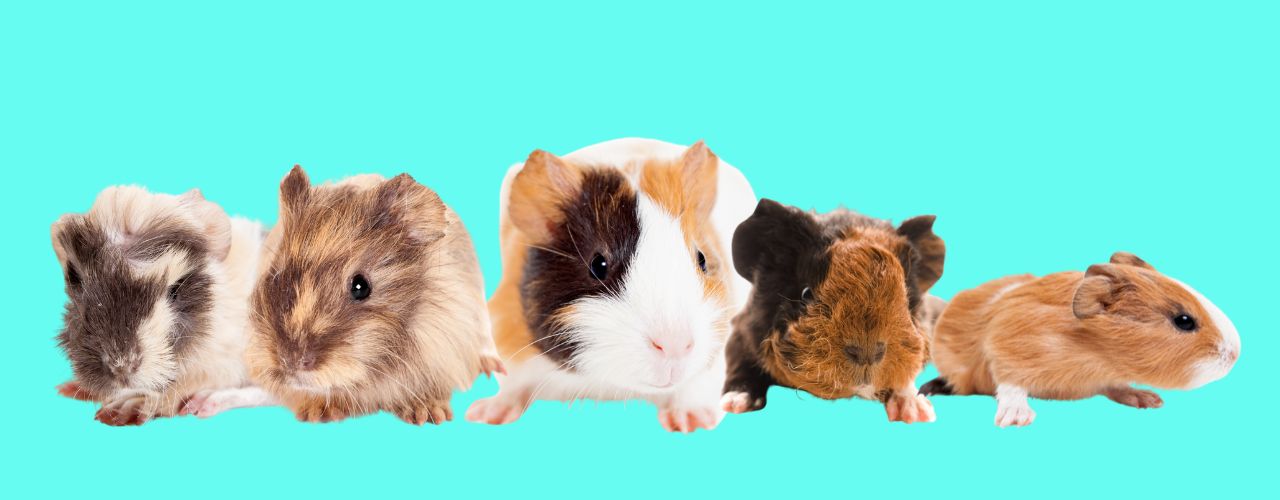Seeing a solo guinea pig is not uncommon and many guinea pig owners report that their single guinea pig is perfectly happy! Some guinea pigs even seem to be aggressive towards other guinea pigs and will get into fights with other guinea pigs when introduced to one. So what’s the truth, can guinea pigs live alone? Of course, having two guinea pigs that constantly fight isn’t better than having a guinea pig live alone, but is there another option? There are a myriad of mental and physical health implications that come along with having a guinea pig live alone, and this should always be the last possible option. So can guinea pigs live alone and should guinea pigs live alone? No, Guinea pigs should not live alone as they are social animals that thrive in pairs and groups. A single guinea pig may develop anxiety, health issues, and have a lower quality of life. Read on to learn why!

Why Do Guinea Pigs Need a Companion?
Let’s start with the most important fact – guinea pigs are herd animals. No matter how they’re bred or socialized, nothing will change the fact that guinea pigs have evolved to live with other guinea pigs. Just like a cat is required to eat meat because of their genetic ancestors, guinea pigs need to have herd-mates.
Will your guinea pig drop dead after a week of being single? Of course not, it’s not that simple. But the implications of living a solo life will slowly begin to wear on them day by day and have lasting and observable impacts, though to the untrained eye they may seem perfectly fine.

What Happens if a Guinea Pig Lives Alone?
Increased Fear and Anxiety
As guinea pigs are prey animals, they are already predisposed to being scared of everything, especially humans as we are predators. Even the most well-balanced, healthy, well socialized guinea pig will still be scared of humans at times when they move too fast or make too much noise. But the benefits of living in a herd is that guinea pigs are able to rely on each other to keep them safe and aware of their surroundings.
Put yourself into a guinea pigs shoes for a moment. You’re a small, defenseless animal out in the middle of nowhere and you know that there are plenty of scary creatures that want to eat you, like birds and snakes. But you live with five friends, all of which also are constantly listening and looking out for scary creatures. Would you feel more safe to say, take a nap or go eat a snack, without feeling the need to constantly be on edge? Odds are that you would, because you trust that in a moment when you’re not as aware of your surroundings your friends still are and can set off a warning whistle if they sense danger. Now realize that your fancy, well-set up cage is the middle of nowhere to your guinea pig and they have no idea that a bird won’t jump out at them in your house. All of those natural instincts are still present in their little, fear-ridden bodies, and not having that friend group to rely on means that they are going to be constantly on-edge, feeling that they may need to run for their survival at any moment.
Guinea pigs guard each other during naps, warn each other of dangers, and travel together for safety. They do not know that you mean them no harm and they do not understand the concept of a house. Over time living with you they will start to understand these things a bit in their conscious mind, but their natural instincts will never go away.
Oftentimes, when owners see these behaviors from their guinea pigs they don’t realize that it’s a sign that their guinea pig needs a friend because they know that these instincts are normal, and though these instincts are normal they are greatly increased and exaggerated in a solo guinea pig.
In addition to the safety aspect, there are a few other reasons that guinea pigs will thrive when given one or more friends.
Lack of Exercise
Additional exercise is a huge benefit of adding a friend. Guinea pigs with one or more friends tend to explore the cage more and will also explore more during floortime, due to a number of factors including the previously mentioned safety, as well as a healthy dose of FOMO and curiosity, and also just generally enjoying being with their friends. Not only will they walk around more but I’ve also found that guinea pigs with friends are far more likely to run around with the zoomies as well as popcorn (jumping up and down in happiness.)
Reduced Hygiene
Herd-mates will also groom each other in spots that they can’t reach, partly as a way of showing affection and partly to keep each other clean. This is honestly one of the most heartwarming things I’ve ever seen and I know you’ll just melt when you witness it for the first time, too. As guinea pigs clean themselves and giving them a bath is challenging, there are often spots on their body that they struggle to reach, but their friends then clean those areas for them.
Decreased Appetite and Interest in Food and Toys
I also find that friends introduce a healthy amount of competition with food and toys that encourages all of the guinea pigs to eat and play more. Like most animals, guinea pigs will steal food from each other and eat faster around one another to prevent their friends from stealing the food. Though in some cases this can be detrimental, like when a dog is encouraged to guard their food bowl, I find that this is actually helpful for guinea pigs as it encourages them to try new foods and eat a variety of vegetables. Some guinea pigs can be a bit picky and I’ve found that one of the best ways to get them to try a new food is to give their herd-mate some. Just like human children, seeing their friend have something makes them want some, too.
I find that the same is true for toys as well. I’ve noticed that many solo guinea pigs won’t really do much with toys aside from chewing on them but when they have friends, they seem to more thoroughly explore toys, tossing them around and playing with them in different ways, as they’ll see their friend doing something with the toy that will pique their interest. This is especially good for guinea pigs mentally, as they don’t have as much of an opportunity to use their brains in our enclosures as they would on the wild, so it is beneficial to encourage different types of behaviors like these. Read our article on food toys if you’d like to learn more about mental enrichment.
No Peers to Learn From
Like most social species, guinea pigs learn a lot from observing and interacting with each other. When a new hidey, food toy, or even a ramp is introduced to a herd, often there will be one confident pig that figures out how to interact with the new object and then the other pigs are able to mirror this behavior. This is very obvious when introducing a loft and ramp to a herd for the first time. Though leaving treats along the ramp can help the guinea pigs to build up the confidence to slowly try to climb it, what usually makes the biggest impact is when one pig just decides to run up it and the other pigs copy them. When a pig lives alone, they have no one to learn from and are far less likely to try new things.
Decreased Warmth When Needed
Though I always recommend having sufficient heating and cooling for your guinea pigs, you never know when something will happen causing the heater to go out. Sometimes, the humans are out of the house or sleeping and don’t realize for a few hours that the house is no longer at an appropriate temperature for their guinea pigs. Guinea pigs have tiny little bodies and because of this it is much more challenging for them to deal with extreme temperatures than it is for us. But in a herd, guinea pigs are able to huddle up in cold temperatures and provide heat for each other.
Potential Overattachment to Humans
One thing I hear from owners a lot is that their guinea pig is fine alone because they themselves will be providing the guinea pig with lots of extra companionship. But is this actually a good thing? Imagine you live in a house that you can never leave and you have one friend that lives with you. You love that friend and cherish every moment with them but then they leave for ten hours every night (to sleep) and then during the day they leave periodically if you’re lucky, and if you’re unlucky they’re gone for nine more house to go to work or school. Is that even better than just not having that friend? Your whole entire world, the one person you love and care about, just leaves you constantly and you may end up even more nervous and afraid when they’re gone.
Alternatively, if you had at least one herd-mate that was always with you and providing you with comfort, you could then have a far more healthy relationship with your human where you appreciate spending time with them but are also perfectly content when they are gone, as you also have your herd-mate to keep you company.

How to Bond Guinea Pigs Successfully
Adopt a pair, when possible
If you are adopting guinea pigs from a shelter or rescue that are no longer babies, the easiest thing to do is to adopt a group or pair that is already bonded. This way, you know that they like each other and probably won’t have any issues where you’ll have to try to find a new friend instead. But this isn’t always possible.
Proper Bonding Technique – How to Introduce a Second Guinea Pig
When trying to bond guinea pigs, many times the bonding will result in fighting, and an owner will decide that their guinea pig is “aggressive” and would be better off alone. 99% of the time this actually isn’t the case and is the result of inadequate bonding technique. If you’ve done this, it’s okay. You’re not a guinea pig expert and guinea pig behavior is a very new field of understanding that is not very well known or understood. But if this is you, please give bonding another try.
The most likely reason this happens is from attempting to bond the guinea pigs too quickly. Personally, I feel that a bonding process should take a couple of weeks, as it’s far better to move slowly than to move too fast. Boys are especially sensitive to the bonding process and generally take longer to successfully bond than girls do.
I recommend a slow process that starts with having the guinea pigs in cages beside each other with a visual barrier in between. Then if everything is going well, remove the visual barrier. Then if that still goes well, put the cages right next to each other so they can touch noses. Then if that goes well, introduce them multiple times in a neutral, large space, being sure to include lots of hay in multiple spots. Then if that goes well you can start to have these floortime sessions be longer and include hideys. And if they continue to like each other do a complete deep clean and reset of a cage and watch them together in the cage for the first hour or so to ensure they actually are happy together. This whole process should include lots of treats (I recommend veggies) and hay so that they both have a good experience.
Generally, owners will encounter issues when they just immediately introduce the guinea pigs without time beforehand for them to get used to having the other one nearby, or sometimes people will even just put one guinea pig in the other pig’s cage. It is important to remember that guinea pigs have no idea what’s going on and need some time to ease into their surroundings, as we can’t just explain to them why they suddenly have a roommate. You should also keep in mind that the whole adoption process is very stressful as they are moving to a whole new place with brand new people and smells and sounds. Using the slow bonding process outlined above also gives your guinea pigs time to get used to their new environment and experience fewer changes all at once.
There are some demographic differences that affect bonding as well. Boys tend to be more challenging to bond and require a slower, more careful approach. They also may not be a good match for every other boy and you may need to try a couple of boys until you find a good match. Boys also tend to only do well in pairs, as boys can be a bit more territorial of each other and the herd dynamics get a bit tricky with three or more boys.
Conversely, girls love to be in big groups and often will get along with most other females when appropriate bonding measures are taken.
Babies of either sex will generally bond easily with boys and girls as they will be amicable and not challenge the older guinea pigs, but special attention should be paid as they get older and go through hormonal changes, as herd dynamics can change.
A neutered boy will generally do well with any amount of girls but it isn’t recommended to have more than one neutered boy in a group of girls as they can get territorial.
Learn more about bonding guinea pigs in Small Pet Select’s Step-by-Step Guide to Bonding.
Exceptions: What Guinea Pigs Should Live Alone
There are a few exceptions where the guinea pig is likely better off alone, however, these exceptions are seriously few and far between, far less than the number of people I’ve had tell me they are an exception. The truth of the matter is that it can be challenging to find a good match for your solo guinea pig, but if you put in the effort you usually will be able to. Claiming a guinea pig is “aggressive” can often be a convenient excuse so you don’t need to admit to yourself that you actually just won’t put in the effort needed to find a good match.
But there are some true exceptions. One example being a guinea pig that has had traumatic experiences, like a boy who was kept in a group of boys and was constantly attacked. A boy like this could be afraid of other boys for good reason, and they may be too old to be safely neutered to live with females.
Even a guinea pig that is the exception will often live a better life if they at least have another guinea pig in a cage beside them, so consider this option if your guinea pig must live alone.
If you think your guinea pig is the exception I highly recommend finding a small pet behaviorist that you can consult with to give you advice on whether your guinea pig is actually the exception or if not, to help you bond them with another guinea pig.
Preventing Pregnancy
When bonding guinea pigs it is vital that you know the sex of each guinea pig with 100% certainty. I’ve found that even shelters are terrible at sexing guinea pigs, especially young ones. A new guinea pig should be taken to an exotic vet anyway, so ask the vet to sex them for you. Additionally, there are many guinea pig groups on Facebook with members happy to help you sex your pig if you post a clear image of their underside. Here is a guide to sexing guinea pigs.
Pregnancy is not only incredibly dangerous for the mother but also, young boys can get girls pregnant as early as three or four weeks of age and this can cause an uncontrollable chain reaction of babies.
Sick Guinea Pigs
This is not to say that it is bad to quarantine sick guinea pigs. Guinea pigs with communicable diseases should absolutely be quarantined during treatment for the safety of the herd but then placed back with their friends when they are no longer able to transmit the disease.
I am not being dramatic when I say it is essential to the well-being of your guinea pig for them to have at least one herd-mate. Herds provide guinea pigs with safety and confidence as well as providing both physical and mental enrichment. This is one of the most important aspects of guinea pig care and should NEVER be overlooked. It really isn’t more challenging to care for two guinea pigs than for one as you still need to do all of the same chores since they’re in a cage together. But if you simply cannot have two pets, I’d recommend considering a hamster instead. Unlike guinea pigs, hamsters are solitary animals that will thrive alone. Here’s a good reference to start considering whether a hamster or guinea pig would be right for you.
If you’re considering adopting guinea pigs or are a new guinea pig parent, check out our New Owner’s Guide for detailed instructions on caring for guinea pigs and all of the basic information that every owner should know!
If this information was helpful to you, consider joining our mailing list for FREE Guinea Pig Care Guides to help you keep track of all of the necessary care tasks as well as monthly guinea pig tips and resources.
FAQ
Can guinea pigs live alone if I give them lots of attention?
No, while giving guinea pigs lots of attention is generally helpful for improving a guinea pig’s confidence and trust with humans, it does not replace their need for a herd-mate in any way as the relationship a guinea pig forms with a human is entirely different, providing different benefits.
Do guinea pigs get lonely?
Yes, a solo guinea pig will experience loneliness and if kept without other guinea pigs for a long period of time will also experience negative effects on their overall health and well-being.
How do I know if my guinea pig is lonely?
If your guinea pig is living without any other guinea pigs, they are lonely. They tend to be more shy, fearful, hide more, and eat less.
What if my guinea pig is aggressive?
99% of guinea pigs that are labeled “aggressive” aren’t aggressive but rather had a hasty bonding session which did not allow them the appropriate amount of time to slowly develop a relationship with the other pig. Also, males may not bond well with every other male and may require attempting the bonding process with various different males to find the right fit.
How long does it take for guinea pigs to bond?
I always suggest a slow bonding process over a period of at least two weeks, unless your guinea pig is particularly social and easy-going.
Can three boy guinea pigs be kept together?
It is generally recommended that boys be only kept in pairs, as having three or more boys can cause them to display territorial behaviors.
What if my guinea pig seems happy alone?
Unless you have seen your guinea pig in a happy, herd situation it is almost impossible to know if your guinea pig is happy alone. What are you comparing their behaviors to? Every guinea pig is different and there is no way to know that your guinea pig is happy alone if they’ve only ever been alone, as you have no idea how differently they act in a herd.
Can I separate my guinea pigs when they’re sick?
If one guinea pig is sick with something that can be passed on to their cage mates, it is often a good idea to quarantine the sick guinea pig for the safety of their herd mates. Additionally, when guinea pigs are sick they can often be more irritable and get into fights, so if you see that happening it may also be helpful to separate the guinea pigs. Return the herd back together when everyone is healthy. They will be okay for the week or two that it takes for them to recover.
Where can I adopt guinea pigs from?
Whether looking for a pair of guinea pigs or a solo guinea pig to introduce to your current solo guinea pig, consider checking your local SPCA and Humane Societies. However, not all shelters have guinea pigs, so check their website or call first. If they do take guinea pigs, they’ll often have them in a group called “Pocket Pets.” There also may be a local guinea pig rescue near you. I find that Facebook is a good way to find local rescues.

